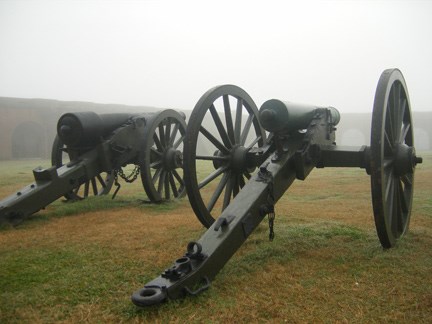
NPS Photo The fighting went badly at first for the North. Plagued by poor generalship, the Federal army in the East was roundly trounced in 1861 and through most of 1862. George B. McClellan's repulse of Robert E. Lee at Antietam Creek was the solitary bright spot. But at Fredericksburg in late 1862 and at Chancellorsville in the spring of 1863 the North again suffered large-scale and critical defeats. This was Lincoln's darkest hour. After Antietam, he had issued the Emancipation Proclamation, declaring free all slaves in rebel territory, but words could not substitute for victories. Now Lee was marching northward again. In July the armies clashed at Gettysburg, and Lee retreated with bloody losses. As the North rejoiced, more good news came from the West. Stubby, quiet-spoken Ulysses S. Grant captured the strategic citadel of Vicksburg, splitting the Confederacy. When he broke the siege of Chattanooga 2 months later, a grateful Lincoln brought him east to command all the Union armies. In May 1864, while another Union force set out across Georgia, Grant advanced southward, bent on destroying Lee's army. Lee fought desperately in the Wilderness and at Spotsylvania. Casualties mounted, and quick victory seemed as far away as ever. The summer of 1864 was one of Lincoln's most difficult. Peace negotiations were begun, but fell through. There was discord in the Cabinet, and in August Lincoln broke with the Radicals in Congress. He soon came to believe that he had no chance of winning reelection. Yet the tide was slowly turning. Two days after the Democrats nominated McClellan for the Presidency, Atlanta fell to W. T. Sherman and Northern morale soared. Lincoln won the November election easily, carrying 22 of the 25 participating States. The war was fast drawing to a close as Lincoln began his second term. Lee was bottled up at Petersburg; Sherman's swath of destruction had badly crippled the South; slavery was dead. Lincoln's concern now was the reconciliation of the two sections. In his inaugural address he described the war as a visitation from God and, mellowed and deepened by the ordeal, he pleaded for peace without malice. On April 9 Lee surrendered to Grant at Appomattox. Two nights later a torchlight procession called at the White House. Instead of a victory speech, Lincoln gave them his moderate views on reconstruction. It was the last public address of a compassionate man. On April 14 he and Mrs. Lincoln went to the theater. During the third act an assassin slipped into the Lincoln's box, shot the President in the head, leaped onto the stage before a startled audience, and fled into the darkness. Soldiers carried the slumped figure across the street to a boardinghouse and laid him across a bed. Surgeons worked over Lincoln all night, but he never regained consciousness. The next morning death came to the man whom power had ennobled. |
Last updated: April 10, 2015
